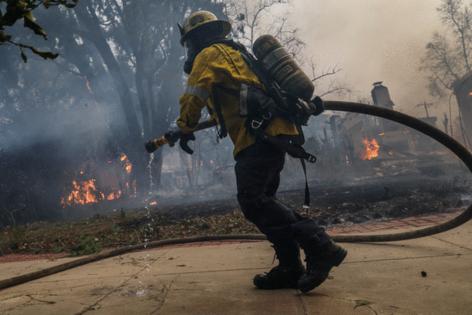Water now safe to drink from all fire-affected utilities in LA area, state says
Published in News & Features
LOS ANGELES — Tap water is now safe to drink in areas served by all nine water systems where damage from the firestorms in Altadena and Pacific Palisades had prompted “do not drink” notices, state regulators said Friday.
The last water utility with such a notice, the Las Flores Water Co. in Altadena, was cleared to resume delivering drinking water and lifted its “do not drink” and “do not boil” advisory on Friday, four months after the notice was issued.
Las Flores has recommended to customers that when they resume using water, they take various steps to flush the household system, including running all the faucets for at least five minutes before using.
Officials from the State Water Resources Control Board said they have been working with utilities to help assess damage, test for potential contamination and ensure it’s safe to resume water service.
“Restoring drinking water service is one of the most vital steps in any disaster recovery,” said State Water Board Chair E. Joaquin Esquivel. “The lifting of all drinking water advisories marks a major milestone in post-fire recovery.”
During and after the fires, the state required local utilities to issue “do not drink” and “do not boil” orders, and to begin testing systems for post-fire contaminants.
According to state estimates, approximately 23,000 water customers were affected by the notices in Pacific Palisades and Altadena.
One contaminant of particular concern was benzene, a carcinogen found in plastic and treated construction wood as well as wildfire smoke — which can enter water systems when they lose pressure during a fire. Residents can be exposed by drinking contaminated water or inhaling benzene that enters the air when tap water is heated up or boiled.
To reestablish safe water, utilities first restore pressure to their system by closing the often thousands of connections left open after the fire. Then, they go through a cycle of flushing water to rid pipes of lingering contaminants, and testing to check if any contamination remains. This process is repeated until the system is deemed clean.
The Los Angeles Department of Water and Power restored safe drinking water to the entirety of Pacific Palisades on March 7.
Two of Altadena’s three main customer-owned water utilities followed suit shortly after: Rubio Cañon Land and Water Association on March 11 and Lincoln Avenue Water Company on March 13.
Several other utilities detected no contaminants in their systems and quickly lifted the “do not drink” orders.
Las Flores Water Co. restored service to some customers by mid-February. However, further up in the foothills, Las Flores’s infrastructure suffered significant damage, leaving the company unable to provide any water to large portions of its service area — let alone ensure the water was safe.
On March 26, Las Flores and Lincoln Avenue completed a connection between the two utilities, allowing Lincoln Avenues’ water supply to flow into Las Flores’ service area. That enabled Las Flores to begin the cycle of testing and flushing, which culminated in the determination that the water was safe to drink.
The restoration of service reflects the differences between water utilities but also the considerable effort that each has undertaken, said Gregory Pierce, director of the UCLA Water Resources Group.
“It really depends on the system, but there is a lot of work to do still to rebuild systems, especially for some of the smaller and medium size systems,” Pierce said. This is complicated, he said, by limited federal funding compared to past fires, as well as pressures on the state budget, and lack of incoming local revenues for the water systems.
Yana Garcia, California’s secretary for environmental protection, said that after the fires, the state has been “laser focused on helping communities recover and rebuild.”
“That includes bringing critical water infrastructure back online,” Garcia said.
©2025 Los Angeles Times. Visit at latimes.com. Distributed by Tribune Content Agency, LLC.







Comments